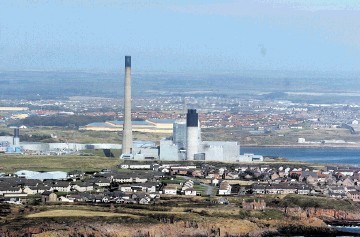
“You can no longer solve the energy problem by ignoring the environment or solve the environment by ignoring energy.”
This was the sentiment of Business Opportunity Manager Bill Spence from Shell Upstream International as he spoke about the oil major’s
CCS (Carbon Capture Storage) project at All-Energy 2015.
He said there could be “no silver bullet” but that both the UK and Scotland – where the Peterhead Carbon Capture Storage project would be based – had begun to take an important lead.
Once completed, it would be the first full-scale CCS project on a gas-based power station.
The project, which is part of the UK government’s CCS commercialisation programme, involves the capture, compression and transportation of CO2 from the existing Peterhead power station to long-term storage sites deep under the seabed of the North Sea.
Speaking to delegates at the two-day event in Glasgow, Mr Spence said the challenge for future energy solutions was less a game of monopoly, but one of “trivial pursuit”.
He said: “It’s very difficult to distinguish between energy and environment – these two pieces are now – and this is where the UK and Scotland have taken the lead – are now one.
“You can no longer solve the energy problem by ignoring the environment or solve the environment by ignoring energy.
“This is one of the places that the UK takes an important lead. One of the things that DECC and the Scottish Government both recognise is that there is no silver bullet to this solution.
“There are a multitude of energy solutions that will be required so it’s less a game of monopoly and more much more a game of trivial pursuit.
“If any of you have played trivial pursuit you’ll know you can’t win by being good at five categories: you have to be good at all six categories so it’s definitely not the case of a silver bullet.
“We have to be good at fuel switching, renewables, efficiency, behaviour change, nuclear and CCS.
“In the simplest of terms what we are proposing to do is to reverse the flow, is to take the CO2 from that power station back out the same pipeline down the same pipe, into that same reservoir that held that natural gas for 50 million years.”
Construction for the project could take 30 months to complete, with an average of 400 workers, which could peak to 600.
The Peterhead project is being developed by Shell, with strategic support from Perth-based utility firm SSE.
It would help to provide clean energy to up to 500,000 homes.
The scheme is one of two projects — the other being the Alstom, Drax Power, BOC and National Grid backed White Rose Project in Yorkshire — chosen last year to go to the next stage of the UK Government’s £1 billion CCS commercialisation competition.
It is designed to capture up to one million tonnes of carbon dioxide emissions and transport them by subsea pipeline to be stored in the depleted Goldeneye gas reservoir around 100km offshore and 2km under the seabed.
Recommended for you
